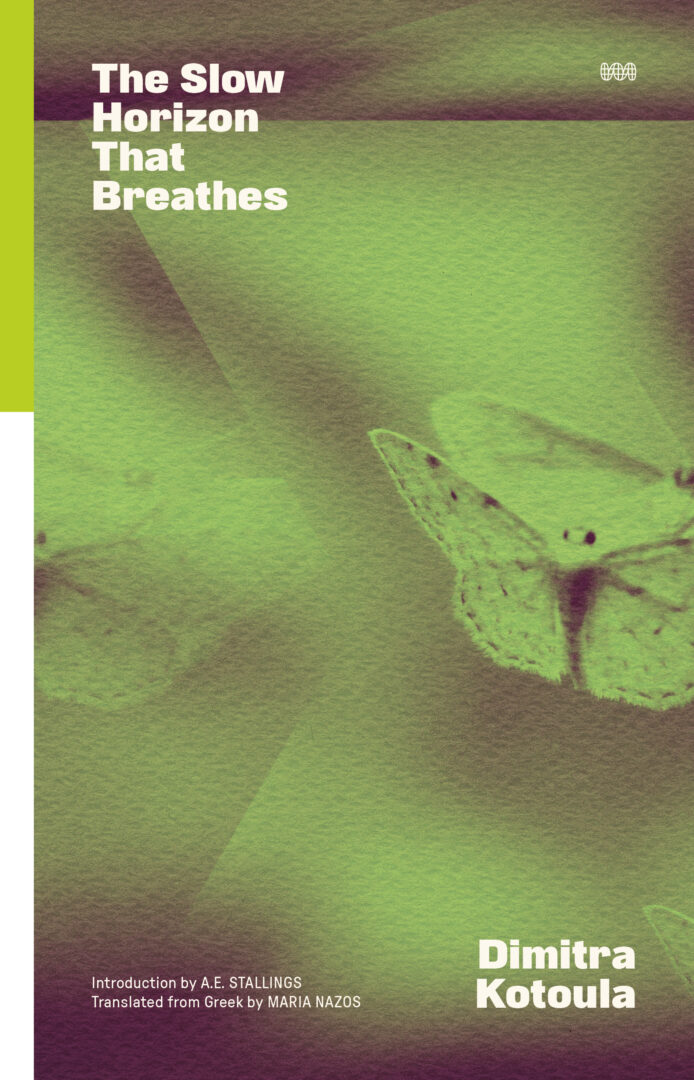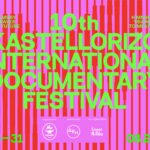The Slow Horizon That Breathes, the debut English-language collection by contemporary Greek poet Dimitra Kotoula, translated by Maria Nazos in close collaboration with the author, and introduced by A.E. Stallings has just been published by World Poetry Books. In this selection from her first three books, published between 2004 – 2022, Kotoula engages modern Greek struggles, including troubled relationships, the financial crisis, motherhood, and the act of writing. Ιn the words of Karen Van Dyck, “writing in dialogue with the twentieth-century poets of ancient myth (George Seferis and Angelos Sikelianos among them), Dimitra Kotoula brings fresh language and a feminine touch to familiar themes”.

In this poetry collection, Kotoula takes on contemporary Greek society in challenging lyrical forms, subtly and masterfully transforming private demons into a public resonance. “Τhe poems shimmer as they transform tragic, ironic histories and alienating religious doctrines into lyrical lines of immediate physical and visceral intensity,” Dzvinia Orlowskh writes. Kotoula reminds us of the “relentless weavings of time / in and out of History.” “History persists,” she writes in one poem, and in another she refers to the “wail of History.” For Kotoula, it is the innocent bystanders of history, the civilians caught up in its crushing gears and cogs, that elicit empathy and engagement.
“A poet of high modern seriousness and lyric grace, who yokes intellectual and philosophical concerns to physical sensuality”, writes A.E. Stallings, Kotoulas distinctive qualities include “lacunose cerebral abstraction, direct lyric authority, and engagement with the body and its desires”. Her voice also embraces an autonomous selfhood based on the female bodily experience which like seasonal landscapes can be both breathtaking and discordant: “I want you to feel this blue / color of loneliness and uncertainty / and nothing else / while the air and earth infame / a sudden blooming.”
Maria Nazos, herself a talented and accomplished poet, proves an ideal translator to bring these difficult, delicate, durable poems into English. Ιn her Translator’s Note, we read: “A mature voice from the very early beginning, Kotoula organizes a poetics that succeeds at addressing the community through what seems to be the only path appropriate to our times: focusing on an individuality that will never cease to call openly to the Other and the World, even in harsh times, when all bridges have been blown up”.
Α.R.
*Dimitra Kotoula is the author of three poetry collections [Three Notes for a Melody (2004), The Constant Narrative (2017), You would be totally undefended (2021)] and recipient of the prestigious Chartis prize. Her poems have been translated into thirteen languages. She was the first to translate Louise Glück’s poems into Greek, and has also translated the work of Jorie Graham and Sharon Olds.
*Maria Nazos’ poetry, translations, and essays are published in The New Yorker, Copper Nickel, and Mid-American Review. She is the author of A Hymn That Meanders (Wising Up Press) and Still Life (Dancing Girl Press).
TAGS: LITERATURE & BOOKS | READING GREECE













